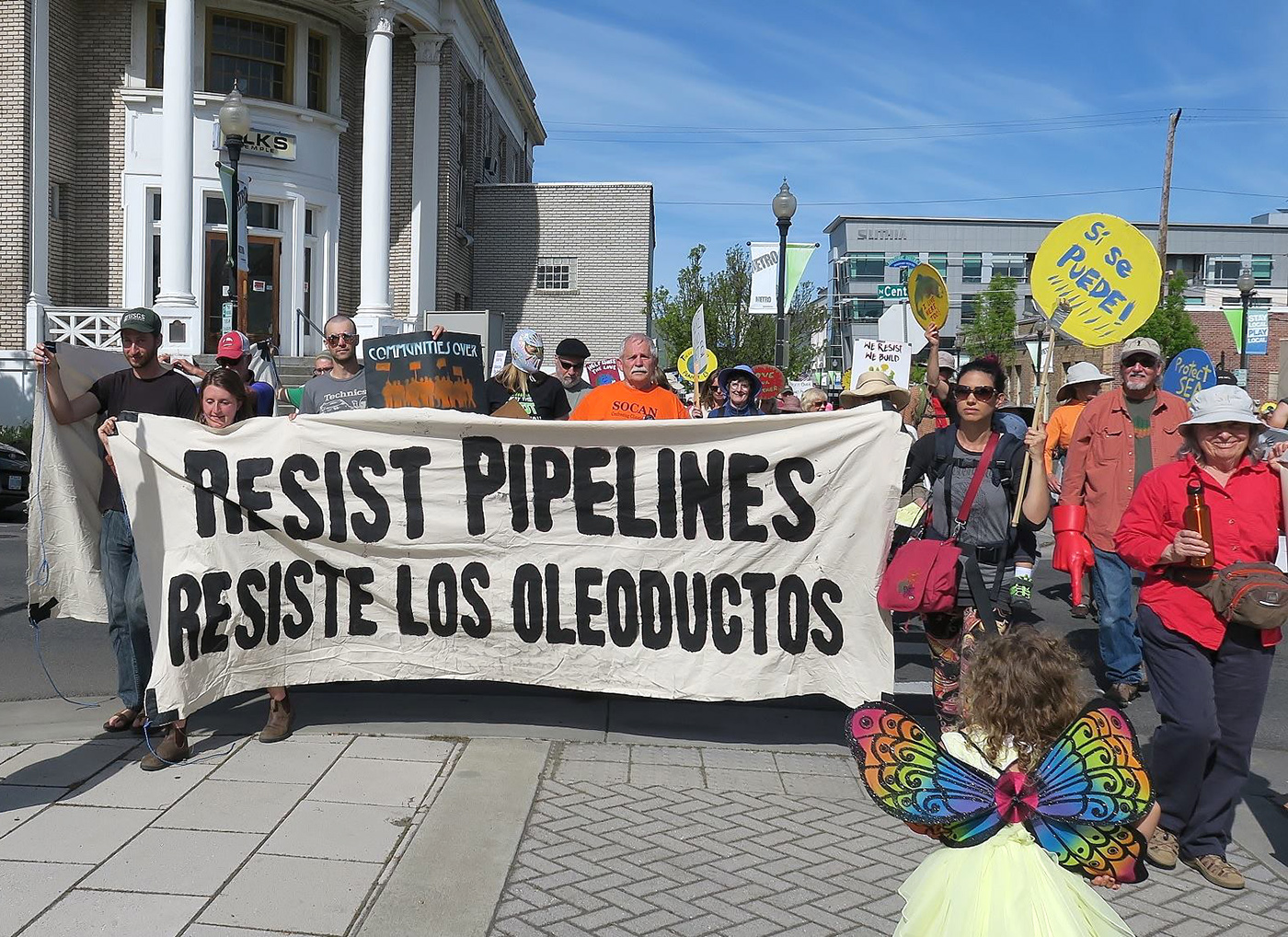Second Call to Action for Friday July 7, 2017
Keep Fracked Natural Gas Out of Oregon!
Fight the Jordan Cove Pipeline!
The Canadian developers of the proposed Jordan Cove project are back, once again trying to push through a 230-mile, 36-inch fracked natural gas pipeline that would cut across Southern Oregon lands and waterways to a proposed Liquefied Natural Gas (LNG) export terminal at Coos Bay.
The Jordan Cove permit was denied twice last year. But now, emboldened by Trump’s new science-denying, anti-environment administration, the Canadian pipeline-building giant Veresen (poised to be acquired by even-bigger oil company Pembina Pipeline Corp.) has reinitiated the permit process, hoping to begin construction as early as 2019.
And it looks like they’re trying to keep Oregonians from having a say in protecting our property, public health, lands and waterways — even to the point of removing materials from Oregon public libraries without permission.
The permit process is at the scoping stage.
The deadline for public comment for this stage is Monday, July 10.
The proposed Jordan Cove pipeline and export facility would:
● Encourage more fracking on public lands in Colorado and other states
● Trample on the rights of Oregon landowners through use of eminent domain
● Disturb traditional tribal lands and burial sites
● Threaten some 400 waterways, including the Rogue River
● Put existing jobs in fishing, tourism, and other sectors at risk
● Create a major new source of climate pollution in Oregon
We Won’t Let that Happen!
Fight the Pipeline!
**ACTION 1: Submit a public comment to FERC**
The Federal Energy Regulatory Commission (FERC) is the regulatory agency that oversees permitting of natural gas pipelines. The period for public comment on the scoping process ends Monday July 10. Right now, you have the opportunity to go online and tell FERC what needs to be included in the Draft Environmental Impact Statement (EIS). In your comments, you may demand that FERC respect all relevant federal and state laws, adequately assess the environmental impacts and safety risks (including greenhouse gas emissions), and seek the consent of impacted landowners as well as Northern California and southern Oregon tribes.
How to Comment:
● Detailed instructions: http://socan.eco/2017-jordon-cove-lng-export-proposal/
● Quick Facts about the Jordan Cove Project: http://www.rogueclimate.org/lng_pipeline
IMPORTANT: If you already submitted comments to FERC prior to February 10, 2017, you will need to resubmit them, or they won’t be considered this round.
Next steps in the permit process:
Once the Draft EIS is produced, that document will be available for further public input. It will then be revised as a Final EIS. It is the basis of that Final EIS that FERC will make its decision.
**ACTION 2: Join Local Activists**
These Jackson County environmental groups are fighting for a healthy planet and against Jordan Cove. Visit their websites to find out when they meet and how you can help.
Rogue Climate helps local communities organize themselves to develop clean energy and climate action plans to transition to renewable energy sources and increase efficiency. We develop leadership, helping young people practice the skills needed to bring about practical solutions.
Rogue Riverkeeper works to protect and restore clean water and native fish in the Rogue watershed. We work to safeguard the health of the Rogue River, using fundamental environmental protections such as the Clean Water Act to improve water quality across the basin’s 3.3 million acres.
Southern Oregon Climate Action Now is a grassroots, volunteer, non-profit organization of area residents who care about climate change and have joined forces to take bold action against it. Through volunteer projects, we focus on reducing the impacts of Global Warming across Southern Oregon.
No LNG Exports is a coalition of groups fighting the Jordan Cove project. Sign the petition, receive updates, or become a volunteer.
**ACTION 3: Learn More**
What FERC Is And Why It Matters [Huffington Post, May 30, 2017]
Methane: The other important greenhouse gas [Environmental Defense Fund]
Environmental Impacts of Natural Gas [Union of Concerned Scientists]











